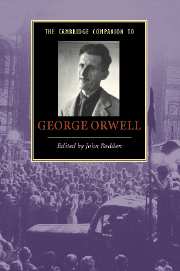Book contents
- Frontmatter
- 1 A political writer
- 2 Orwell and the biographers
- 3 Englands His Englands
- 4 The truths of experience: Orwell’s nonfiction of the 1930s
- 5 The fictional realist: novels of the 1930s
- 6 Orwell’s essays as a literary experience
- 7 ‘My country, right or left’: Orwell’s patriotism
- 8 Orwell and the British Left
- 9 Orwell, anti-Semitism and the Holocaust
- 10 Orwell, Socialism and the Cold War
- 11 Animal Farm: history as fable
- 12 Nineteen Eighty-Four: context and controversy
- 13 Orwell, the academy and the intellectuals
- 14 Orwell for today’s reader: an open letter
- 15 George Orwell: a bibliographic essay
- 16 Why Orwell still matters
- Further reading
- Index
6 - Orwell’s essays as a literary experience
Published online by Cambridge University Press: 28 July 2007
- Frontmatter
- 1 A political writer
- 2 Orwell and the biographers
- 3 Englands His Englands
- 4 The truths of experience: Orwell’s nonfiction of the 1930s
- 5 The fictional realist: novels of the 1930s
- 6 Orwell’s essays as a literary experience
- 7 ‘My country, right or left’: Orwell’s patriotism
- 8 Orwell and the British Left
- 9 Orwell, anti-Semitism and the Holocaust
- 10 Orwell, Socialism and the Cold War
- 11 Animal Farm: history as fable
- 12 Nineteen Eighty-Four: context and controversy
- 13 Orwell, the academy and the intellectuals
- 14 Orwell for today’s reader: an open letter
- 15 George Orwell: a bibliographic essay
- 16 Why Orwell still matters
- Further reading
- Index
Summary
The experience of reading George Orwell's essays is special - bracing, illuminating, invigorating. It is not the specific judgements Orwell makes as much as the action of his thinking and the movement of his feeling that distinguish him. He took stands on issues; he had convictions and expressed his principles. But this is not the defining fact about Orwell as a literary figure, as an artist. He is a great essayist because of the experience he creates for readers - a provocation of the intellect, an education of the intelligence, which includes but exceeds the positions he advocated. Orwell aims in his essays to make readers more self-conscious, more aware of how we think and feel.
A demanding writer, Orwell requires close attention and incites self-scrutiny. In his literary enterprise, if not in his style, he is akin to Ralph Waldo Emerson, for in his essays Orwell exhibits 'man thinking' (Emerson's phrase in 'The American Scholar', 1837), and the Emerson-like creation of unorthodox thinking is his goal. Self-reliance and non-conformity: these are Emerson's central terms, and they signify Orwell's ambition and activity as a writer of essays as well.
The immediate impact of Orwell's sentences and paragraphs is not Emersonian: Emerson is more allusive and harder to fathom from line to line. But an intention as essayists unites them: like Emerson, Orwell shapes sentences that disconcert and surprise readers; he impels us to feel discontented with stock ideas and conventional opinions. Orwell resolutely believed in common sense (he called this his ‘belly-to-earth attitude’), but at the same time he recognises that common sense is hard to acquire, and this is because false kinds of common sense saturate society, culture and politics. Genuine common sense is needed to counter what we have come unthinkingly to accept as ‘common sense’ – the received views that all of us are accustomed to and that we tell ourselves we know are true.
- Type
- Chapter
- Information
- The Cambridge Companion to George Orwell , pp. 76 - 86Publisher: Cambridge University PressPrint publication year: 2007
- 2
- Cited by



